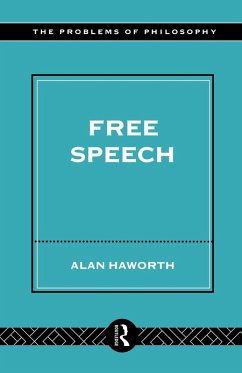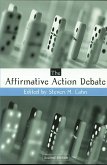Alan Haworth
Free Speech
Alan Haworth
Free Speech
- Broschiertes Buch
- Merkliste
- Auf die Merkliste
- Bewerten Bewerten
- Teilen
- Produkt teilen
- Produkterinnerung
- Produkterinnerung
Free Speech is a philosophical treatment of a topic which is of immense importance to all of us. Writing with great clarity, wit, and genuine concern, Alan Haworth situates the main arguments for free speech by tracing their relationship to contemporary debates in politics and political philosophy, and their historical roots to earlier controversies over religious toleration. Free Speech will appeal to anyone with an interest in philosophy, politics and current affairs.
Andere Kunden interessierten sich auch für
![Public and Private Public and Private]() Ursula Vogel (ed.)Public and Private59,99 €
Ursula Vogel (ed.)Public and Private59,99 €![Rights, Bodies and Recognition Rights, Bodies and Recognition]() Tom RockmoreRights, Bodies and Recognition59,99 €
Tom RockmoreRights, Bodies and Recognition59,99 €![The Affirmative Action Debate The Affirmative Action Debate]() Steven Cahn / Steven M. Cahn (eds.)The Affirmative Action Debate56,99 €
Steven Cahn / Steven M. Cahn (eds.)The Affirmative Action Debate56,99 €![Free Speech in the Digital Age Free Speech in the Digital Age]() Free Speech in the Digital Age44,99 €
Free Speech in the Digital Age44,99 €![Wittgenstein, Politics and Human Rights Wittgenstein, Politics and Human Rights]() Robin HoltWittgenstein, Politics and Human Rights70,99 €
Robin HoltWittgenstein, Politics and Human Rights70,99 €![Speech Of Edmund Burke On Conciliation With The Colonies (1900) Speech Of Edmund Burke On Conciliation With The Colonies (1900)]() Edmund BurkeSpeech Of Edmund Burke On Conciliation With The Colonies (1900)20,99 €
Edmund BurkeSpeech Of Edmund Burke On Conciliation With The Colonies (1900)20,99 €![A Vindication of the Rights of Men A Vindication of the Rights of Men]() Mary WollstonecraftA Vindication of the Rights of Men12,99 €
Mary WollstonecraftA Vindication of the Rights of Men12,99 €-
-
-
Free Speech is a philosophical treatment of a topic which is of immense importance to all of us. Writing with great clarity, wit, and genuine concern, Alan Haworth situates the main arguments for free speech by tracing their relationship to contemporary debates in politics and political philosophy, and their historical roots to earlier controversies over religious toleration. Free Speech will appeal to anyone with an interest in philosophy, politics and current affairs.
Hinweis: Dieser Artikel kann nur an eine deutsche Lieferadresse ausgeliefert werden.
Hinweis: Dieser Artikel kann nur an eine deutsche Lieferadresse ausgeliefert werden.
Produktdetails
- Produktdetails
- Verlag: Routledge
- Seitenzahl: 280
- Erscheinungstermin: 3. September 1998
- Englisch
- Abmessung: 216mm x 140mm x 17mm
- Gewicht: 399g
- ISBN-13: 9780415148054
- ISBN-10: 0415148057
- Artikelnr.: 22206637
- Herstellerkennzeichnung
- Libri GmbH
- Europaallee 1
- 36244 Bad Hersfeld
- gpsr@libri.de
- Verlag: Routledge
- Seitenzahl: 280
- Erscheinungstermin: 3. September 1998
- Englisch
- Abmessung: 216mm x 140mm x 17mm
- Gewicht: 399g
- ISBN-13: 9780415148054
- ISBN-10: 0415148057
- Artikelnr.: 22206637
- Herstellerkennzeichnung
- Libri GmbH
- Europaallee 1
- 36244 Bad Hersfeld
- gpsr@libri.de
Alan Haworth
Preface and acknowledgements; Part 01 PART ONE; Section 01 I An introduction to the argument; Section 01
01
01 1.1 Mill's argument and Mine; Section 01
01
02 1.2 The place of Mill's argument in philosophy and in history; Section 01
01
03 1.3 What is the problem?; Section 01
01
04 1.4 Getting the story right; Section 02 II The liberty of thought and discussion; Section 02
01
01 2.1 Thought and discussion prioritised; Section 02
01
02 2.2 What is 'thought and discussion'?; Section 02
01
03 2.3 A crack in the fabric: Mill's 'corn dealer' example; Section 03 III A case study; Section 03
01
01 3.1 A German attack on applied ethics; Section 03
01
02 3.2 A short exercise in 'deconstruction'; Section 03
01
03 3.3 A note on 'assuming infallibility'; Section 03
01
04 3.4 Conclusion and postscript; Section 04 IV Truth and consequences; Section 04
01
01 4.1 The anti
consequentialist consensus; Section 04
01
02 4.2 The objections from integrity and negative responsibility; Section 04
01
03 4.3 Assessing the consequences; Section 04
01
04 4.4 A note on the 'free market in ideas'; Section 05 V Consequentialism and the right to free speech; Section 05
01
01 5.1 The anti
consequentialist argument from rights; Section 05
01
02 5.2 Consequentialism: conclusions; Section 06 VI The value of truth; Section 06
01
01 6.1 The value of truth and the threat of relativism; Section 06
01
02 6.2 Value relativism: truth and the good society; Section 06
01
03 6.3 Value relativism: whose vision?; Section 06
01
04 6.4 Epistemic relativism: the 'true believer'; Section 06
01
05 6.5 An appeal to science; Section 06
01
06 6.6 Epistemic relativism: Rorty's revisionist liberalism; Section 06
01
07 6.7 Conclusion: are we trapped in a house of mirrors?; Section 07 VII Areopagitica's aftermath; Section 07
01
01 7.1 'One discussion more'; Section 07
01
02 7.2 Parallels and perspective; Section 07
01
03 7.3 Patterns of repression; Section 07
01
04 7.4 Conclusion: the lie of the land; postscript Postscript to Part One: taking stock of the classic defence; Part 02 PART TWO; Section 08 VIII Contract and convention; Section 08
01
01 8.1 Contract and convention: 'literal' contractualism; Section 08
01
02 8.2 'Conventionalist' contractualism; Section 08
01
03 8.3 Some interim conclusions; Section 08
01
04 8.4 Contractualism and value relativism; Section 08
01
05 8.5 Conclusion: contractualism and rights; Section 09 IX From the contract to free speech?; Section 09
01
01 9.1 Free speech as a 'basic liberty'; Section 09
01
02 9.2 Free speech and democracy; Section 09
01
03 9.3 Free speech and liberty of conscience; Section 09
01
04 9.4 From the contract to free speech?; Section 09
01
05 9.5 Contractualism since 1972; Section 10 X Concerning toleration; Section 10
01
01 10.1 Locke's argument from 'just bounds'; Section 10
01
02 10.2 Toleration as a model for free speech; Section 10
01
03 10.3 Locke's argument: conclusions; Section 10
01
04 10.4 The contractualist approach: taking stock; Section 11 XI Conclusions and prospects; Section 11
01
01 11.1 Conclusions; Section 11
01
02 11.2 Prospects; appendix Appendix: Milton and Mill: a comparison of extracts; Notes; References; Index;
01
01 1.1 Mill's argument and Mine; Section 01
01
02 1.2 The place of Mill's argument in philosophy and in history; Section 01
01
03 1.3 What is the problem?; Section 01
01
04 1.4 Getting the story right; Section 02 II The liberty of thought and discussion; Section 02
01
01 2.1 Thought and discussion prioritised; Section 02
01
02 2.2 What is 'thought and discussion'?; Section 02
01
03 2.3 A crack in the fabric: Mill's 'corn dealer' example; Section 03 III A case study; Section 03
01
01 3.1 A German attack on applied ethics; Section 03
01
02 3.2 A short exercise in 'deconstruction'; Section 03
01
03 3.3 A note on 'assuming infallibility'; Section 03
01
04 3.4 Conclusion and postscript; Section 04 IV Truth and consequences; Section 04
01
01 4.1 The anti
consequentialist consensus; Section 04
01
02 4.2 The objections from integrity and negative responsibility; Section 04
01
03 4.3 Assessing the consequences; Section 04
01
04 4.4 A note on the 'free market in ideas'; Section 05 V Consequentialism and the right to free speech; Section 05
01
01 5.1 The anti
consequentialist argument from rights; Section 05
01
02 5.2 Consequentialism: conclusions; Section 06 VI The value of truth; Section 06
01
01 6.1 The value of truth and the threat of relativism; Section 06
01
02 6.2 Value relativism: truth and the good society; Section 06
01
03 6.3 Value relativism: whose vision?; Section 06
01
04 6.4 Epistemic relativism: the 'true believer'; Section 06
01
05 6.5 An appeal to science; Section 06
01
06 6.6 Epistemic relativism: Rorty's revisionist liberalism; Section 06
01
07 6.7 Conclusion: are we trapped in a house of mirrors?; Section 07 VII Areopagitica's aftermath; Section 07
01
01 7.1 'One discussion more'; Section 07
01
02 7.2 Parallels and perspective; Section 07
01
03 7.3 Patterns of repression; Section 07
01
04 7.4 Conclusion: the lie of the land; postscript Postscript to Part One: taking stock of the classic defence; Part 02 PART TWO; Section 08 VIII Contract and convention; Section 08
01
01 8.1 Contract and convention: 'literal' contractualism; Section 08
01
02 8.2 'Conventionalist' contractualism; Section 08
01
03 8.3 Some interim conclusions; Section 08
01
04 8.4 Contractualism and value relativism; Section 08
01
05 8.5 Conclusion: contractualism and rights; Section 09 IX From the contract to free speech?; Section 09
01
01 9.1 Free speech as a 'basic liberty'; Section 09
01
02 9.2 Free speech and democracy; Section 09
01
03 9.3 Free speech and liberty of conscience; Section 09
01
04 9.4 From the contract to free speech?; Section 09
01
05 9.5 Contractualism since 1972; Section 10 X Concerning toleration; Section 10
01
01 10.1 Locke's argument from 'just bounds'; Section 10
01
02 10.2 Toleration as a model for free speech; Section 10
01
03 10.3 Locke's argument: conclusions; Section 10
01
04 10.4 The contractualist approach: taking stock; Section 11 XI Conclusions and prospects; Section 11
01
01 11.1 Conclusions; Section 11
01
02 11.2 Prospects; appendix Appendix: Milton and Mill: a comparison of extracts; Notes; References; Index;
Preface and acknowledgements; Part 01 PART ONE; Section 01 I An introduction to the argument; Section 01
01
01 1.1 Mill's argument and Mine; Section 01
01
02 1.2 The place of Mill's argument in philosophy and in history; Section 01
01
03 1.3 What is the problem?; Section 01
01
04 1.4 Getting the story right; Section 02 II The liberty of thought and discussion; Section 02
01
01 2.1 Thought and discussion prioritised; Section 02
01
02 2.2 What is 'thought and discussion'?; Section 02
01
03 2.3 A crack in the fabric: Mill's 'corn dealer' example; Section 03 III A case study; Section 03
01
01 3.1 A German attack on applied ethics; Section 03
01
02 3.2 A short exercise in 'deconstruction'; Section 03
01
03 3.3 A note on 'assuming infallibility'; Section 03
01
04 3.4 Conclusion and postscript; Section 04 IV Truth and consequences; Section 04
01
01 4.1 The anti
consequentialist consensus; Section 04
01
02 4.2 The objections from integrity and negative responsibility; Section 04
01
03 4.3 Assessing the consequences; Section 04
01
04 4.4 A note on the 'free market in ideas'; Section 05 V Consequentialism and the right to free speech; Section 05
01
01 5.1 The anti
consequentialist argument from rights; Section 05
01
02 5.2 Consequentialism: conclusions; Section 06 VI The value of truth; Section 06
01
01 6.1 The value of truth and the threat of relativism; Section 06
01
02 6.2 Value relativism: truth and the good society; Section 06
01
03 6.3 Value relativism: whose vision?; Section 06
01
04 6.4 Epistemic relativism: the 'true believer'; Section 06
01
05 6.5 An appeal to science; Section 06
01
06 6.6 Epistemic relativism: Rorty's revisionist liberalism; Section 06
01
07 6.7 Conclusion: are we trapped in a house of mirrors?; Section 07 VII Areopagitica's aftermath; Section 07
01
01 7.1 'One discussion more'; Section 07
01
02 7.2 Parallels and perspective; Section 07
01
03 7.3 Patterns of repression; Section 07
01
04 7.4 Conclusion: the lie of the land; postscript Postscript to Part One: taking stock of the classic defence; Part 02 PART TWO; Section 08 VIII Contract and convention; Section 08
01
01 8.1 Contract and convention: 'literal' contractualism; Section 08
01
02 8.2 'Conventionalist' contractualism; Section 08
01
03 8.3 Some interim conclusions; Section 08
01
04 8.4 Contractualism and value relativism; Section 08
01
05 8.5 Conclusion: contractualism and rights; Section 09 IX From the contract to free speech?; Section 09
01
01 9.1 Free speech as a 'basic liberty'; Section 09
01
02 9.2 Free speech and democracy; Section 09
01
03 9.3 Free speech and liberty of conscience; Section 09
01
04 9.4 From the contract to free speech?; Section 09
01
05 9.5 Contractualism since 1972; Section 10 X Concerning toleration; Section 10
01
01 10.1 Locke's argument from 'just bounds'; Section 10
01
02 10.2 Toleration as a model for free speech; Section 10
01
03 10.3 Locke's argument: conclusions; Section 10
01
04 10.4 The contractualist approach: taking stock; Section 11 XI Conclusions and prospects; Section 11
01
01 11.1 Conclusions; Section 11
01
02 11.2 Prospects; appendix Appendix: Milton and Mill: a comparison of extracts; Notes; References; Index;
01
01 1.1 Mill's argument and Mine; Section 01
01
02 1.2 The place of Mill's argument in philosophy and in history; Section 01
01
03 1.3 What is the problem?; Section 01
01
04 1.4 Getting the story right; Section 02 II The liberty of thought and discussion; Section 02
01
01 2.1 Thought and discussion prioritised; Section 02
01
02 2.2 What is 'thought and discussion'?; Section 02
01
03 2.3 A crack in the fabric: Mill's 'corn dealer' example; Section 03 III A case study; Section 03
01
01 3.1 A German attack on applied ethics; Section 03
01
02 3.2 A short exercise in 'deconstruction'; Section 03
01
03 3.3 A note on 'assuming infallibility'; Section 03
01
04 3.4 Conclusion and postscript; Section 04 IV Truth and consequences; Section 04
01
01 4.1 The anti
consequentialist consensus; Section 04
01
02 4.2 The objections from integrity and negative responsibility; Section 04
01
03 4.3 Assessing the consequences; Section 04
01
04 4.4 A note on the 'free market in ideas'; Section 05 V Consequentialism and the right to free speech; Section 05
01
01 5.1 The anti
consequentialist argument from rights; Section 05
01
02 5.2 Consequentialism: conclusions; Section 06 VI The value of truth; Section 06
01
01 6.1 The value of truth and the threat of relativism; Section 06
01
02 6.2 Value relativism: truth and the good society; Section 06
01
03 6.3 Value relativism: whose vision?; Section 06
01
04 6.4 Epistemic relativism: the 'true believer'; Section 06
01
05 6.5 An appeal to science; Section 06
01
06 6.6 Epistemic relativism: Rorty's revisionist liberalism; Section 06
01
07 6.7 Conclusion: are we trapped in a house of mirrors?; Section 07 VII Areopagitica's aftermath; Section 07
01
01 7.1 'One discussion more'; Section 07
01
02 7.2 Parallels and perspective; Section 07
01
03 7.3 Patterns of repression; Section 07
01
04 7.4 Conclusion: the lie of the land; postscript Postscript to Part One: taking stock of the classic defence; Part 02 PART TWO; Section 08 VIII Contract and convention; Section 08
01
01 8.1 Contract and convention: 'literal' contractualism; Section 08
01
02 8.2 'Conventionalist' contractualism; Section 08
01
03 8.3 Some interim conclusions; Section 08
01
04 8.4 Contractualism and value relativism; Section 08
01
05 8.5 Conclusion: contractualism and rights; Section 09 IX From the contract to free speech?; Section 09
01
01 9.1 Free speech as a 'basic liberty'; Section 09
01
02 9.2 Free speech and democracy; Section 09
01
03 9.3 Free speech and liberty of conscience; Section 09
01
04 9.4 From the contract to free speech?; Section 09
01
05 9.5 Contractualism since 1972; Section 10 X Concerning toleration; Section 10
01
01 10.1 Locke's argument from 'just bounds'; Section 10
01
02 10.2 Toleration as a model for free speech; Section 10
01
03 10.3 Locke's argument: conclusions; Section 10
01
04 10.4 The contractualist approach: taking stock; Section 11 XI Conclusions and prospects; Section 11
01
01 11.1 Conclusions; Section 11
01
02 11.2 Prospects; appendix Appendix: Milton and Mill: a comparison of extracts; Notes; References; Index;









